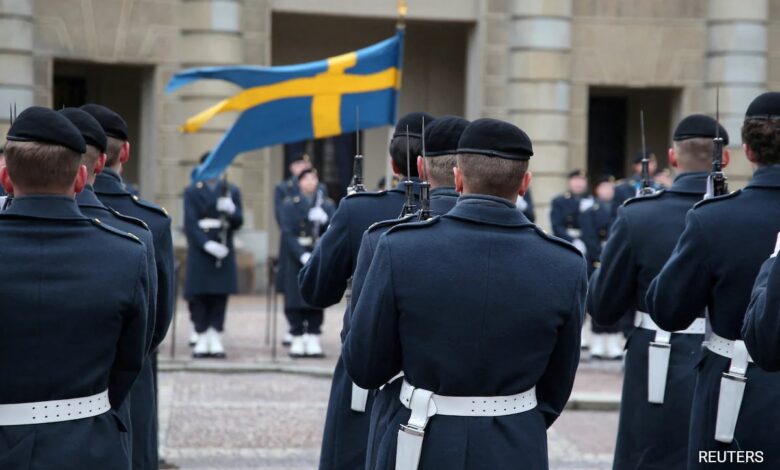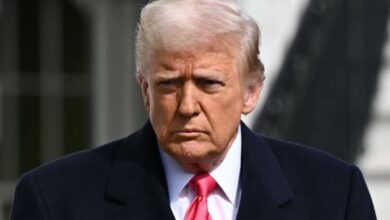Sweden Becomes NATO’s 32nd Member After Two-Year Wait


Sweden has not been involved in a war, including World War II, since the Napoleonic conflicts.
Washington:
Sweden on Thursday became the 32nd member of NATO in the shadow of the war in Ukraine, ending two centuries of official non-alignment and capping two years of torturous diplomacy.
Swedish Prime Minister Ulf Kristersson on Thursday hailed his country’s entry into NATO as a “victory for freedom,” as it turned the page on two centuries of non-alignment following Russia’s invasion of Ukraine.
The accession “is a victory for freedom today. Sweden has made a free, democratic, sovereign and united choice to join NATO,” he said at a ceremony in Washington with US Secretary of State Antony Blinken.
“This is a historic day. Sweden will now take its rightful place at NATO’s table, with an equal say in shaping NATO policies and decisions,” NATO Secretary-General Jens Stoltenberg said in a statement.
“After over 200 years of non-alignment Sweden now enjoys the protection granted under Article 5, the ultimate guarantee of allies’ freedom and security,” he said.
The Swedish government announced it was holding a special government meeting to approve accession.
Later in the day, the Swedish Prime Minister is to attend the annual State of the Union address by President Joe Biden, who has been struggling to persuade the rival Republican Party to approve new aid to Ukraine.
Sweden’s blue and golden-yellow flag is expected to be hoisted on Monday at the Brussels headquarters of the North Atlantic Treaty Alliance.
Russia has vowed “countermeasures” over Sweden’s entry into NATO, especially if the alliance’s troops and assets deploy in the country.
Sweden and Finland, while both militarily intertwined with the United States and members of the European Union, have historically steered clear of officially joining NATO, formed in the Cold War to unite against the Soviet Union.
After Finland joined last year, Sweden’s membership means all the countries surrounding the Baltic Sea, except Russia, will be part of the US-led military alliance.
That has led some to label the sea a “NATO lake”, with the Western allies now appearing well-placed to strangle Russia’s room for manoeuvre in the crucial shipping route if a war with Moscow ever breaks out.
– Turning page on non-alignment –
Sweden has not been involved in a war, including World War II, since the Napoleonic conflicts of the early 19th century.
But Finland and Sweden launched a joint bid after Russia in 2022 invaded Ukraine, which had unsuccessfully sought to join NATO — which considers an attack on one member an attack on all.
Finland successfully joined in April 2023.
Sweden’s candidacy stalled due to an assertive push by Turkey, which demanded that Stockholm, known for its liberal asylum policies, crack down on Kurdish militants who have campaigned against Ankara.
Turkish President Recep Tayyip Erdogan later demanded action after protesters, enjoying Swedish laws on free speech, desecrated Islam’s holy book the Koran.
In a clear if unstated sweetener, the United States dangled the prospect of F-16 warplanes to Turkey, which has faced the wrath of US sanctions over a major military purchase from Russia.
The Biden administration in January approved $23 billion in F-16 warplanes to Turkey swiftly after it ratified Sweden’s membership.
The United States simultaneously pushed ahead with $8.6 billion in more advanced F-35 jets for Greece, a fellow NATO member that has a historic rivalry and frequent tensions with Turkey.
Even with Turkey’s blessing, Sweden faced another obstacle as it needed approval of a last country — Hungary, whose nationalist prime minister, Viktor Orban, has often thumbed his nose at Western allies.
The Hungarian parliament ratified Sweden’s membership on February 26. But in one last hiccup, Hungary could not formally sign the accession document due to a brief absence in the mostly ceremonial post of president, after an Orban ally resigned in a scandal over pardoning a convicted child abuser’s accomplice.
A recent poll by Swedish broadcaster SR said that most Swedes believe the country made too many sacrifices to join NATO, although more than three-quarters believed NATO would strengthen the country’s security.




